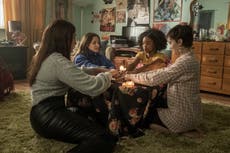The Independent's journalism is supported by our readers. When you purchase through links on our site, we may earn commission.
Major Arcana: The portraits redefining modern witchcraft
Frances Denny’s images of modern witches around America ‘were not made to be lovely, inviting or easy’
When it comes to the all-encompassing sting of misogyny, the archetypal idea of a “witch” is perhaps the one most steeped in sexism. It is also the most enduring. Nearly every culture to have existed has some sort of mythology and lore surrounding witchcraft. Ancient Greek tales spoke of Circe, who lured men to her island and turned them into pigs. In male-centric Christianity, she is a servant of Satan, an evil who must be eradicated at all costs. In classic fairy tales collected by the Brother’s Grimm, she tricks innocent children and eats them whole.
These stereotypes are pervasive, but in recent years witches and non-witches alike have been challenging these problematic ideas. One such individual is New York-based photographer Frances F Denny, who has been seeking out modern-day witches around the US. These striking images have been collected in Major Arcana: Portraits of Witches in America.
Denny’s work is both an exploration of contemporary witchcraft and a challenge to the patriarchal stereotype of what a witch is. “These portraits were not made to be lovely, inviting or easy,” she explains. “We are so used to consuming images of the female form through the media we imbibe every day. While my pictures invite your gaze, they also challenge us to see humanity in a subject that has been so vilified and misconstrued.
“Not all my subjects identify as female, but their portraits ask you to rethink your own preconception of what or who a witch is – and thereby, who and what a woman is.”
The project began when Denny herself discovered that her 10th great-grandfather was a judge in the Salem Witch Trials, a notorious period of history when 200 people were accused of witchcraft in Massachusetts between 1692 and 1693. She also realised that her 8th great-grandmother was accused of witchcraft around the same time. “This coincidence didn’t sit easily with me,” she says.
The practice and/or belief in witchcraft has been maligned for centuries. “Since the 1500s, ‘witch’ has been an epithet directed against individuals – usually women – with the intent of subordinating them. The word was a powerfully effective moniker, stoking fear and mistrust of women, depicting them as wild, violent, rapacious creatures; seductresses or hags oath-bound to Satan.”
However, thanks in large part to the post-war British Pagan revival and a rapidly growing interest in modern Wicca, this is starting to change. In recent years, it’s now one of the fastest-growing religions in the world, with some research suggesting there may be as many as 1.5 million people in the US alone who identify as Wicca or Pagan.
Denny is eager to point out that while she “sees her pictures as descriptive of the modern witch, they are in no way definitive of her”. Witchcraft can take many forms: it can be based on healing, rituals or attuning yourself to the planet; it can be derived from your ideas or from teachings older than modern thought.
“If I’ve learned a single thing during the course of my work, it’s that there is no single way to be a witch,” she explains. “It’s a ‘roll your own’ identity. In fact, it’s so hard to put your finger on, it defies definition. There are those who consider themselves neo-pagans, there are religious Wiccans who capitalise the ‘w’ in ‘Witch’, and there are secular witches, too. There are green witches and hedge witches, sex witches and poet witches, witches who practise tarot or astrology or occult ritual.”
As witchcraft grows in popularity, its problematic connotations are being reimagined. “Since being reclaimed from its oppressive origins, being a ‘witch’ has both embraced that shadowy lineage and been reborn from it,” says Denny. “In a world where women’s rights are still being fought for and defended, I think it’s clear that ‘witch’ is as political an identity as is ‘woman’.”
Major Arcana: Portraits of Witches in America by Frances F Denny (Andrew McMeel Publishing) is available to buy here
Join our commenting forum
Join thought-provoking conversations, follow other Independent readers and see their replies
Comments




Bookmark popover
Removed from bookmarks